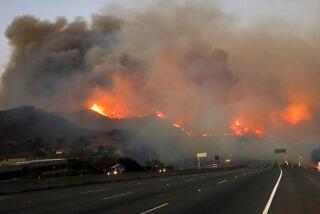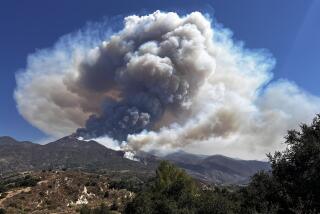The Logic of a Wildfire Fee
Californians who move to the suburban edge relish the open brush, steep ravines or dense forest: Ah, they think, now I’m living next to nature. Then come the coyotes, mountain lions and, especially, wildfires.
When the fires are out, and their land has either been spared or devastated, understandably the last thing on their mind is how much the state’s taxpayers have shelled out in the battle. According to the legislative analyst’s office, it fell to state government to protect 88% of the private property affected by last year’s catastrophic wildfires. These residents and businesses gain extraordinary benefit each year from a high-tech firefighting program costing $590 million a year at this point, not to mention from the individual firefighters who put their lives on the line.
Last year, the state finally began to ask the hard question: Who bears the cost when people choose a particularly risky place to live? It’s increasingly a problem as flatter suburban areas fill in and development pushes into rustic hills and canyons where fighting fires is more difficult and dangerous.
The Legislature’s common-sense response was that both the property owners and taxpayers in general pay. People have a right to live where they want and still enjoy public services. But they also should bear a bit of the burden for extraordinary services. Thus last year the state passed a law to assess $35 per parcel on property that it must protect against wildfires -- almost a third of all California land. The small fee would raise a little more than $50 million a year.
Republicans persuaded Gov. Arnold Schwarzenegger to withdraw this already approved fee from his budget proposal, demanding its repeal as a “hidden tax.” Firefighting is basic public safety. Even the most conservative politicians don’t want to cut it. The edge-dwellers who would pay the modest annual fee benefit from state firefighters, while most urban and suburban households have never seen a state fire crew in the flesh.
If the Republican legislators have their way, the state would make up the full firefighting amount out of the general fund. That could happen -- though it’s hard to see how this year -- but a cash-strapped fire service might also have to trim purchases of valuable equipment and delay maintenance. Last week, the joint legislative budget committee’s majority Democrats moved to restore the fee.
Its fate is uncertain even as fires rip startlingly early scars across the state’s mountainsides, threatening homes and sending state firefighters into action in Santa Clarita and elsewhere. Republicans should remember the historical GOP philosophy that individuals take responsibility for their actions, rather than relying on the state. The fire fee would, in modest part, do that.
More to Read
Sign up for Essential California
The most important California stories and recommendations in your inbox every morning.
You may occasionally receive promotional content from the Los Angeles Times.










